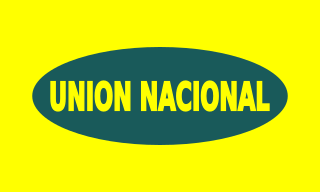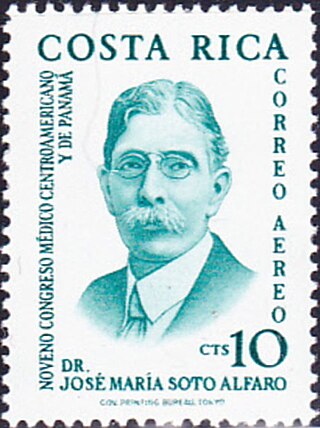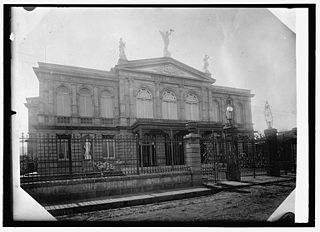Related Research Articles

Ramón Bernardo Soto Alfaro was the Olympus President of Costa Rica from 1885 to 1889 during the Liberal State.

The Social Christian Unity Party is a centre-right political party in Costa Rica.

The Costa Rican Renewal Party is a Christian political party in Costa Rica.

The National Union Party is the name of several parties in Costa Rica, generally located on the centre-right of the political spectrum.
The name Constitutional was used for several loosely connected Costa Rican parties throughout history.

General elections were held in Costa Rica on 7 December 1913, the first direct elections since 1844. They were also the first elections to have universal male suffrage, after economic and educational requirements were eliminated. Máximo Fernández Alvarado of the Republican Party won the presidential election, but both he and runner-up Carlos Durán Cartín later resigned and Alfredo González Flores was appointed president by Congress on 8 May 1914. The Republican Party also won the parliamentary election.

General elections were held in Costa Rica on 7 December 1919. Julio Acosta García of the Constitutional Party won the presidential election, whilst the party also won the parliamentary election, in which they received 75% of the vote.

General elections were held in Costa Rica on 9 February 1936. León Cortés Castro of the National Republican Party won the presidential election, whilst the party also won the parliamentary election, in which they received 59% of the vote. Voter turnout was 69%.

General elections were held in Costa Rica on 13 February 1944. Teodoro Picado Michalski of the Victory Bloc won the presidential election with 75% of the vote. Voter turnout was 43%.

José Maria Soto Alfaro (1860-1931) was a surgeon and Costa Rican politician, brother of President Bernardo Soto Alfaro. Soto studied medicine at the University of Paris in 1885, practiced the first gastrostomy, thyroidectomy and cesarean section in Costa Rica. He practiced medicine at the Faculty of Medicine of Costa Rica and at the San Juan de Dios Hospital. sometimes deputy in the Constitutional Congress. Convinced tinoquista, he strongly supported the brief regime of two years imposed by the brothers Tinoco after the coup d'etat of 1917 and founded the "January 27 Club" in commemoration of the date of overthrow of Alfredo González Flores. After Federico Tinoco was overthrown and his brother José Joaquín was assassinated, Soto accepted to run as a presidential candidate against the opposition leader Don Julio Acosta García, although the nomination was merely symbolic since Acosta had the triumph assured it was important to avoid a single candidate election, something that it is recognized as a patriotic service.
General elections were held in Costa Rica in 1889. Electors for the electoral college were elected on 7 October 1889, who in turn elected the president on 1 December 1889. It was particularly notorious for been the first time in Costa Rica's history that political parties took part in an election. The date of November 7 is still commemorated in Costa Rica as "Democracy's Day" due to the outcome of the liberal government accepting the results of the conservative opposition, as to that point, authoritarian governments were the norm.
General elections were held in Costa Rica in 1894. Voters elected members of the electoral college on 4, 5 and 6 February, who in turn elected the president on 1 April.
General elections were held in Costa Rica on 1 April 1906. They were held during the presidency of Ascensión Esquivel Ibarra. Ibarra openly supported candidate Cleto González Víquez. Other candidates were former president Bernardo Soto Alfaro, former State and Police Secretary Tobías Zúñiga Castro, the also former State Secretary Máximo Fernández Alvarado and former justice and Foreign Secretary Ezequiel Gutiérrez Iglesias. Difference were more personal than ideological as all candidates except Gutiérrez were liberals, and the election had a strong "anti-cletista" component. This "anti-cletismo" was what united the opposition and talks about a common joint front occurred but it was not applied. Gutiérrez was candidate of the conservative "Democratic Union", the party that emerged from the now outlawed Catholic Union.

The First Costa Rican Republic is the name given to the historical period between the proclamation of the Republic of Costa Rica in the 1848 reformed Constitution and the official decree by then President José María Castro Madriz on 31 August 1848 and the Costa Rican Civil War of 1948 which ended with the enactment of the current 1949 Constitution on 7 November 1949 starting the Second Costa Rican Republic.
The Catholic Union was a Costa Rican political party, emerged during the government of President José Rodríguez Zeledón. It was the first ideological party founded in Costa Rica. Its full name was Catholic Union of the Clergy of Costa Rica, and it had a conservative and confessional ideology, although it also endorsed the nascent Social doctrines of the Catholic Church. It participated in the legislative elections of 1892 and obtained an important number of deputies, although not enough to impose itself over the coalition liberals and pro-government of Rodriguez.

Liberalism in Costa Rica is a political philosophy with a long and complex history. Liberals were the hegemonic political group for most of Costa Rica's history especially during the periods of the Free State and the First Republic, however, as the liberal model exhausted itself and new more left-wing reformist movements clashed during the Costa Rican Civil War liberalism was relegated to a secondary role after the Second Costa Rican Republic with the development of Costa Rica's Welfare State and its two-party system controlled by social-democratic and Christian democratic parties.

The Liberal State is the historical period in Costa Rica that occurred approximately between 1870 and 1940. It responded to the hegemonic dominion in the political, ideological and economic aspects of liberal philosophy. It is considered a period of transcendental importance in Costa Rican history, as it's when the consolidation of the National State and its institutions finally takes place.

The Reform State or Reformist State is the period in 20th-century Costa Rican history when the country switched from the uncontrolled capitalism and laissez-faire approach of the Liberal State into a more economically progressive Welfare State. It began about 1940 during the presidency of social reformer Rafael Angel Calderón Guardia, and ended in the 1980s with the neoliberal reforms inherent in the Washington Consensus that began after the government of Luis Alberto Monge.

Freemasonry begins in Costa Rica at the same time as in Central America during the course of the 19th century. Regular masonry begins when it was founded by Costa Rican Catholic priest Francisco Calvo, ex-Chaplain General of the Army of Costa Rica during the Filibuster War of 1856, who introduced regular masonry in Central America in 1865. However, there is evidence of the existence of "non-regular" Lodges active after the Independence and before. Prominent Costa Rican figures of politics, literature, art and science, including several presidents of the Republic, were Freemasons.

General elections were held in Costa Rica on 6 February 2022, to elect the president, two vice-presidents, and all 57 deputies of the Legislative Assembly. As none of the presidential nominees obtained at least 40% of the votes, a runoff was held on 3 April 2022, between the top two candidates, José María Figueres and Rodrigo Chaves Robles.
References
- ↑ González Chaves, Daniel (2014). "Los partidos políticos en Costa Rica: un acercamiento histórico". Revista Asociación para el Fomento de los Estudios Históricos en Centroamérica. Archived from the original on 2015-06-20.
- ↑ Salazar Mora, Orlando; Salazar Mora, Jorge (1991). Partidos políticos en Costa Rica. EUNED. ISBN 9789977645940.